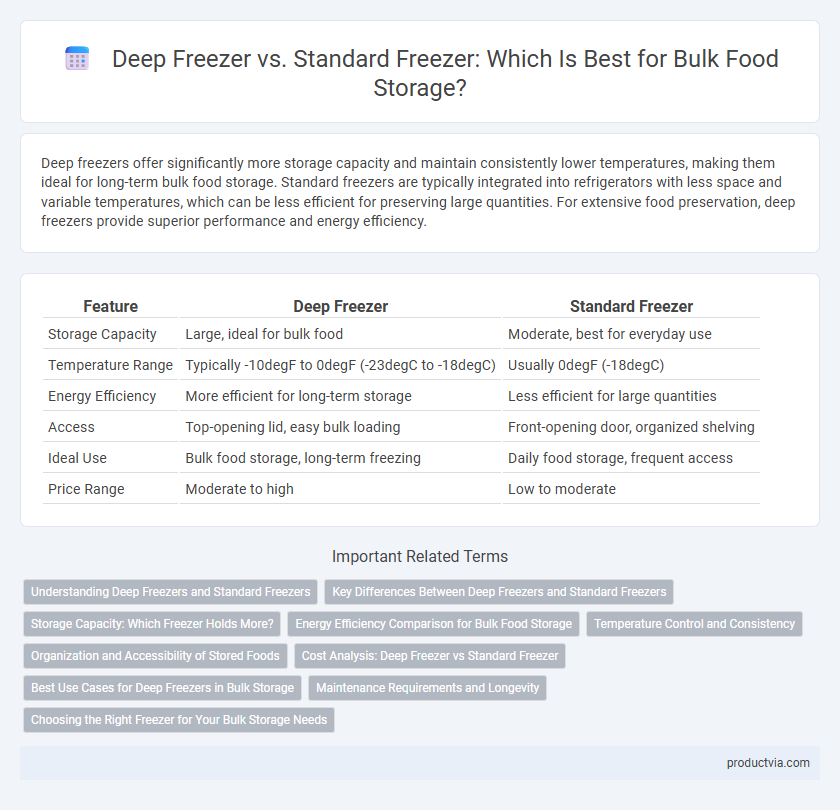Deep freezers offer significantly more storage capacity and maintain consistently lower temperatures, making them ideal for long-term bulk food storage. Standard freezers are typically integrated into refrigerators with less space and variable temperatures, which can be less efficient for preserving large quantities. For extensive food preservation, deep freezers provide superior performance and energy efficiency.
Table of Comparison
| Feature | Deep Freezer | Standard Freezer |
|---|---|---|
| Storage Capacity | Large, ideal for bulk food | Moderate, best for everyday use |
| Temperature Range | Typically -10degF to 0degF (-23degC to -18degC) | Usually 0degF (-18degC) |
| Energy Efficiency | More efficient for long-term storage | Less efficient for large quantities |
| Access | Top-opening lid, easy bulk loading | Front-opening door, organized shelving |
| Ideal Use | Bulk food storage, long-term freezing | Daily food storage, frequent access |
| Price Range | Moderate to high | Low to moderate |
Understanding Deep Freezers and Standard Freezers
Deep freezers are designed to maintain temperatures well below freezing, typically ranging from -10degF to 0degF, making them ideal for long-term bulk food storage by preserving food quality and preventing freezer burn. Standard freezers usually operate around 0degF and are better suited for short-term storage and everyday use, with less energy efficiency for large quantities. Understanding these temperature ranges and storage capacities helps determine the best freezer type based on the volume of food and duration of preservation needed.
Key Differences Between Deep Freezers and Standard Freezers
Deep freezers maintain consistently lower temperatures, typically around -18degC or colder, ideal for long-term bulk food storage by preserving nutrients and preventing freezer burn. Standard freezers operate at higher temperatures, usually around -15degC, suitable for everyday food storage but less effective for large quantities over extended periods. Deep freezers often feature chest or upright designs with thicker insulation, offering greater energy efficiency and larger capacity compared to standard freezer models.
Storage Capacity: Which Freezer Holds More?
Deep freezers typically offer larger storage capacities compared to standard freezers, making them ideal for bulk food storage. Their design often includes more deep, spacious compartments that maximize volume without occupying excessive kitchen space. Standard freezers generally have less capacity and are better suited for everyday frozen items rather than large quantities.
Energy Efficiency Comparison for Bulk Food Storage
Deep freezers typically offer superior energy efficiency compared to standard freezers due to their thicker insulation and more compact design, reducing cold air loss during frequent access. Standard freezers consume more power when used for bulk food storage as their larger, less insulated compartments require more energy to maintain low temperatures. Choosing a deep freezer can result in significant energy savings and lower utility costs when storing large quantities of food over an extended period.
Temperature Control and Consistency
Deep freezers maintain a consistent temperature typically between -10degF to -20degF, which is crucial for preserving bulk food quality and preventing freezer burn. Standard freezers often fluctuate around 0degF, making them less reliable for long-term storage of large quantities. Precise temperature control in deep freezers ensures optimal food safety and extends the shelf life of bulk items.
Organization and Accessibility of Stored Foods
Deep freezers typically offer more spacious compartments with tall, stackable bins that enhance organization and maximize bulk food storage. Standard freezers often feature multiple shelves and door racks, allowing easier categorization and quick access to frequently used items. Choosing a deep freezer provides better long-term storage solutions, while a standard freezer prioritizes accessibility and frequently rotated food inventory.
Cost Analysis: Deep Freezer vs Standard Freezer
Deep freezers typically offer lower long-term energy costs due to their efficient insulation and temperature maintenance compared to standard freezers, which consume more electricity for frequent temperature regulation. Initial purchase prices for deep freezers are generally higher, but the reduced operational costs can result in substantial savings over time, especially for bulk food storage. Standard freezers may be more affordable upfront, but their higher energy consumption often leads to increased utility bills, making deep freezers the more cost-effective option for extended food preservation.
Best Use Cases for Deep Freezers in Bulk Storage
Deep freezers offer optimal cold storage solutions for bulk food due to their lower temperature settings, which preserve food freshness longer than standard freezers. Ideal for large families, restaurants, or food businesses, deep freezers handle extensive quantities of meat, vegetables, and prepared meals with minimal frost buildup. Their spacious capacity and efficient energy consumption make them the preferred choice for long-term bulk storage and heavy-duty freezing needs.
Maintenance Requirements and Longevity
Deep freezers typically require less frequent defrosting and have more robust compressors, resulting in lower maintenance demands compared to standard freezers. Their heavy-duty design extends longevity, often lasting 10 to 15 years, whereas standard freezers generally offer a lifespan of around 8 to 12 years due to more frequent temperature fluctuations. Regular maintenance of deep freezers ensures optimal performance, preserving bulk food quality and reducing operational costs over time.
Choosing the Right Freezer for Your Bulk Storage Needs
Deep freezers offer superior insulation and consistent low temperatures ideal for preserving large quantities of bulk food over extended periods, reducing freezer burn and nutrient loss. Standard freezers, often integrated into refrigerators, provide convenient access and are suitable for moderate storage but may fluctuate in temperature, affecting food longevity. Selecting the right freezer depends on storage volume, frequency of access, and energy efficiency requirements to ensure optimal preservation and cost-effectiveness.
Deep Freezer vs Standard Freezer for Bulk Food Storage Infographic

 productvia.com
productvia.com